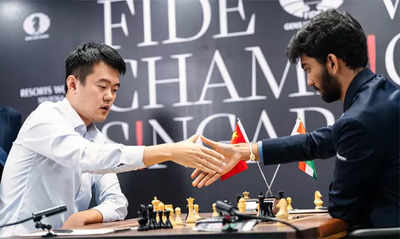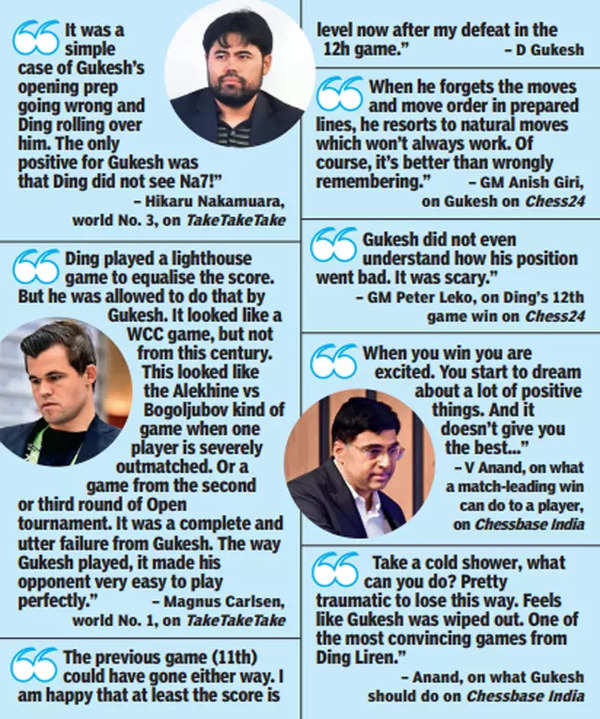
The World Chess Championship (WCC) stands at a tantalizing juncture. A series of seven consecutive draws in the middle games between world champion Diren Ling of China and his Indian challenger D Gukesh, may have lulled the casual observer into thinking that this duel was seriously lacking in excitement and aggression. But the experts have been continuously pointing out over the past fortnight that there is much that lies beneath.
While they have conceded that this is arguably the most human of all title matches in the classical format, there still lurks the unknown, though the pattern does point out to Ding drawing Gukesh towards his favoured tiebreaks ‘endgame’.
As things stand, with two games remaining, how Gukesh extracts himself from this web and emerges in those prodigious colours that was so expected of him will be foremost on Indian fans’ minds. Remember, if scores remain level after 14 games (either through draws or one win for each player), the match goes to rapid tiebreaks scheduled on Friday.
Will the players remain ultracautious in the final two classical games on Wednesday (Gukesh gets white) and Thursday (Ding white)? Because one slip could decide the match. Who will manage nerves better in tiebreaks? There are more questions than answers as we head to the climax in this cerebral war between the Chinese emperor and the Indian prince.
Do the past trends in WCC Matches provide an answer? TOI takes a look…
Last two games when scores are equal (since 2000)
2006: 2-2. Last two games drawn. Kramnik beat Topalov in tiebreaks.
2010: 2-2. Game 11 drawn. Anand beat Topalov in Game 12 with black and retained the title.
2012: 1-1. Both draws. Anand beat Gelfand via tiebreaks.
2016: 1-1. Both draws. Carlsen beat Karjakin via tiebreaks.
2018: 0-0. Both draws. Carlsen beat Caruana via tiebreaks.
2023: 3-3. Both draws. Ding beat Nepo via stiebreaks.
Summary: Only Anand-Topalov match saw a decisive result. Other matches went to tiebreaks.

In the 2000, 2004, 2008, 2013, 2014 and 2021 matches, either the scores were not level before the last two games or the matches got over with one or more classical games to spare.
Is losing five games too many?
Though Ding Liren has bounced back, he has already lost five games in his WCC career so far – three against Nepo last year and two against Gukesh (third and 11th game) in the ongoing match. Both world champions before Magnus Carlsen (since 2000), had to vacate their crowns once they lost five games in their WCC careers. Carlsen lost only two of 56 WCC games and forfeited his right to play last year.
Kramnik: After dethroning Kasparov without losing a game in 2000, Kramnik lost two games against Leko in the winning campaign of 2004. And when he suffered his third loss against Anand in Bonn (2008), his days with the crown were numbered.
Anand: Having lost one game each against Kramnik in 2008 and Gelfand in 2012, besides two against Topalov in 2010, Anand lost his fifth WCC game against Carlsen in their fifth game in Chennai (2013). He trailed 0-1 and never recovered, eventually losing the match 0-3 with two games to spare. In other words, if Ding manages to retain his crown, he will be the first player to do so despite losing five career games in world championships since 2000.
0-1, 1-1, 2-1, 2-2
The scoreline through four decisive games for Gukesh as he trailed after the first game, equalised in the third game, led after the 11th and was forced to draw level after the 12th. Only Anand (vs Topalov in 2010), Leko (vs Kramnik in 2004) and Kasparov (vs Karpov 1985) have experienced such a sequence in the last 60 years of WCC match history. Anand and Kasparov went on to win while Kramnik retained the title being the defending champion as there was no provision of tiebreaks then.
Strike back in next game after trailing WCC matches since 1995
1995: Anand wins G9, Kasparov G10.
2006: Topalov G9, Kramnik G10.
2010: Topalov wins G1, Anand G2
2012: Gelfand G7, Anand G8
2014: Carlsen G2, Anand G3
2023: Nepo wins G5, Ding G6
2024: Gukesh G11, Ding G12
(All above wins were via white pieces)
Summary: Except for Anand in 2014, the player who struck back immediately went on to win the match.




